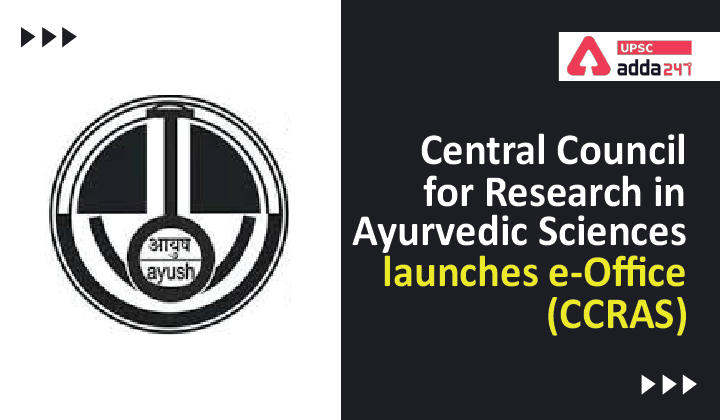Table of Contents
Central Council for Research in Ayurvedic Sciences (CCRAS)- Relevance for UPSC Exam
- GS Paper 2: Governance, Administration and Challenges- Government policies and interventions for development in various sectors and issues arising out of their design and implementation.
Central Council for Research in Ayurvedic Sciences (CCRAS)- Context
- Recently, the Central Council for Research in Ayurvedic Sciences (CCRAS) has initiated the use of eOffice for its official purposes.
- The Central Council for Research in Ayurvedic Sciences (CCRAS) has launched the eOffice application in its quest for becoming a paperless organization.
District Good Governance Index (DGGI) | J&K to have District-level Governance Index
Central Council for Research in Ayurvedic Sciences (CCRAS)- Key Points
- About: CCRAS is an apex body in India for the formulation, coordination, development, and promotion of research on scientific lines in the Ayurveda and Sowa-Rigpa systems of medicine.
- Parent Ministry: The Central Council for Research in Ayurvedic Sciences (CCRAS) is an autonomous body of the Ministry of AYUSH.
- CCRAS is the largest Research Council under the Ministry of AYUSH (Ayurveda, Yoga & Naturopathy, Unani, Siddha and Homeopathy), Government of India.
- Mission of CCRAS:
- To aim for AYUSHMAN Bharat by way of promoting better health through evidence-based Ayurvedic principles and practices.
- To develop CCRAS into a dynamic, vibrant and model research organization for the undertaking, coordinating, aiding and promoting research in Ayurveda.
- To bring-up modern scientific knowledge, technology to explore Ayurveda scientific treasure following prevalent scientific methods.
- To attain global leadership in research for treatment and prevention of emerging important lifestyle-related disease and health requirements.
PMFME Scheme: ‘Delhi Bakes’ First ODOP
eOffice Program- Key Points
- About: The eOffice platform is a digital workplace solution comprising a suite of products and features that support efficient and transparent governance by streamlining all workflow and making all procedures paperless.
- Development: The eOffice platform was developed by National Informatics Centre (NIC), Ministry of Electronics and Information Technology.
- Key Objective: The eOffice aims to support Governance by ushering in more effective and transparent inter and Intra-Government processes.
- The e-Office also aims to achieve a simplified, responsive, effective and transparent working of all Government Offices.
- Benefits of e-Office:
- Enhance transparency – files can be tracked, and their status is known to all at all times
- Increase accountability – the responsibility of quality and speed of decision-making is easier to monitor.
- Assure data security and data integrity.
- Provide a platform for re-inventing and re-engineering the Government.
- Promote innovation by releasing staff energy and time from unproductive procedures.
- Transform the Government’s work culture and ethics.
- Promote greater collaboration in the workplace and effective knowledge management.
District Good Governance Index




 TSPSC Group 1 Question Paper 2024, Downl...
TSPSC Group 1 Question Paper 2024, Downl...
 TSPSC Group 1 Answer key 2024 Out, Downl...
TSPSC Group 1 Answer key 2024 Out, Downl...
 UPSC Prelims 2024 Question Paper, Downlo...
UPSC Prelims 2024 Question Paper, Downlo...




